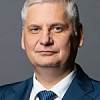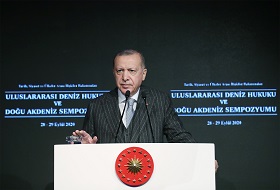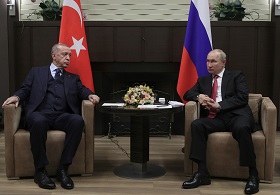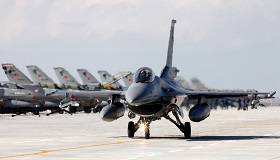The dynamically developing relations between Ankara and Kiev bring into focus such issues as Turkey’s vigorous penetration into the post-Soviet space, its willingness to act as a military and political patron of a number of former Soviet countries and aid them in strengthening their relations with NATO despite their non-NATO member status. Do these developments make conflict in the Black Sea more likely? What risks would this create for Russia and its interests?
Today, President Erdogan consistently promotes the idea of Turkey being a mediator between Russia and Ukraine. Yet, he is just as consistent in promoting ideas and practices that are unacceptable to Moscow. Erdogan has made no secret of the fact that he does not recognize Russian jurisdiction over Crimea, while the Russian authorities have declared that the issue of the status of the peninsula is “closed.”
For Ukraine, President Erdogan and the Turkish establishment are a sympathetic audience, especially when it comes to the loss of Kiev’s sovereignty over Crimea. Turkish officials miss no opportunity to stress that they do not recognize Russian authority over the peninsula.
But Turkey does not focus on Crimea only. The Turkish elite, realizing the complexity of relations between Moscow and Kiev, uses Ukrainian channels to express its dissatisfaction with Russian stance on other foreign policy issues. This was the case during Erdogan’s visit to Kiev on February 3, 2020, which was timed to coincide with the 28th anniversary of the establishment of diplomatic relations between the Republic of Turkey and post-Soviet Ukraine. It also took place against the backdrop of a sharp military escalation in Syria. The Turkish President lambasted the Russian leadership for deliberately turning a blind eye to the actions of the “Syrian regime.”
However, despite the commonality of interests and growing cooperation between the sides, Ankara will most likely try to compensate for its emotions with regard to Ukraine by being pragmatic in its relations with Russia. No matter how intensively cooperation between Ankara and Kiev may develop, Erdogan is not trying to give up its role as an “intermediary” between Ukraine and Russia. He is under no illusion that the West would be satisfied if it were Turkey pulling the chestnuts out of the fire and not the “Euro-Atlantic brotherhood.”
It appears as if Erdogan wants to become one of the key actors in the Ukrainian game—a player without whom any reconfiguration in the Black Sea region would be, if not impossible, then extremely unlikely.
On February 3, 2022, President of Turkey Recep Tayyip Erdogan made an official visit to Ukraine, during which he managed to put his signature to a Turkey–Ukraine free trade agreement following more than ten years of negotiations on the provisions of the document. But this was not the only achievement of the President’s visit: Ankara and Kiev also signed a framework document on the construction of a facility that will produce Turkish unmanned aerial vehicles in Ukraine.
The dynamically developing relations between Ankara and Kiev bring into focus such issues as Turkey’s vigorous penetration into the post-Soviet space, its willingness to act as a military and political patron of a number of former Soviet countries and aid them in strengthening their relations with NATO despite their non-NATO member status. Do these developments make conflict in the Black Sea more likely? What risks would this create for Russia and its interests?
The Caucasus and Ukraine: Two Links in the Same Chain
After the Second Karabakh War, the Armenian–Azerbaijani conflict was no longer a predominantly regional ethnopolitical confrontation rooted in the consequences of the dissolution of the Soviet Union. The strategic link between Ankara and Baku formed in the early 1990s has gone from strength to strength. Opportunities for Turkey and Azerbaijan to collectively exert pressure on Armenia (military, political and diplomatic) and Georgia (in terms of economic cooperation) have expanded. Russia’s hegemony in the South Caucasus has been challenged. At the same time, the Turkish strategy of strengthening its positions in Eurasia has created additional tensions in Ankara’s relations with its NATO allies and with Iran.
However, the events of 2020 did not lead to changes in just one region of the post-Soviet space. Turkey’s growing presence in the South Caucasus has opened up opportunities for it to build up political and economic influence in the Black Sea. And the expansion of multifaceted cooperation with Ukraine is one of the most obvious consequences of Turkey’s encroachment into the former Soviet Union.
Today, President Erdogan consistently promotes the idea of Turkey being a mediator between Russia and Ukraine. Yet, he is just as consistent in promoting ideas and practices that are unacceptable to Moscow. Erdogan has made no secret of the fact that he does not recognize Russian jurisdiction over Crimea, while the Russian authorities have declared that the issue of the status of the peninsula is “closed.”
Military-technical cooperation between Ankara and Kiev has long ceased to be merely a part of the foreign policy activity of the two states. On September 29, 2021, the Ministry of Defence of Ukraine and the Bayraktar Savunma signed a Memorandum of Cooperation on the construction of a joint training and testing centre for the maintenance, repair and modernization of UAVs and training of personnel. In late October 2021, Ukraine used a Bayraktar strike drone for the first time in the armed conflict in the southeast of the country, in violation of the peace agreement between the parties. Following the strike, a group of reconnaissance officers from the Armed Forces of Ukraine infiltrated and captured the village of Staromaryevka located in the so-called “grey zone” between the DPR (the unrecognized Donetsk People’s Republic) and Ukraine. Such operations are very much to the liking of Ukraine’s partner countries in Eastern Europe. In the autumn of 2021, Minister of Defence of the Republic of Latvia Artis Pabriks suggested that EU and NATO countries follow Ankara’s example and learn from its experience in developing relations with Kiev without taking the position of Moscow into consideration.
In this context, it is worth noting a certain incongruence between the approaches of the United States and Turkey’s other NATO allies to its actions in the Caucasus and Ukraine. France could not (and cannot) tolerate Ankara’s unequivocal support for Baku, while the United States has adopted a position of cautious restraint. Washington and Paris are co-chairs of the OSCE Minsk Group, and they are concerned about Turkey’s “revisionism” in the Caucasus. This explains why both the French and the American sides are prepared to put up with Russia being the only major player in Nagorno-Karabakh as an inevitability or a lesser evil.
There is an Armenian lobby in the United States and France. Without exaggerating the role that it plays in the politics of both countries, we can say that the issues of Karabakh independence and the Armenian genocide in the Ottoman Empire are present in the American and French narratives. Yet there is no scenario in which one could possibly imagine a discussion of the self-determination of the Donbass republics taking place in Congress or the National Assembly of France. It is unlikely that influential groups (not individual members of parliaments) calling for the recognition of Crimea as part of Russia will appear in either country any time soon.
Thus, the collective West sees Turkey’s advances in Ukraine as being far less nuanced than the strengthening of the strategic alliance between Turkey and Azerbaijan. Some countries of the “New Europe” even believe that Ankara is acting as any NATO member can (and should) act in its relations with Ukraine—without any kind of political correctness or reservations, something that representatives of Germany, France, Italy, Hungary and other EU countries resort to from time to time. All this cannot but embolden Turkey to take new steps to build allied relations with Kiev. In turn, Ukraine, tired of sitting on its hands waiting for NATO to make up its mind about the country’s membership in the organization, is ready to welcome Turkey with open arms.
But does Turkey’s growing activity in the Black Sea necessarily mean that its relations with Russia will suffer greatly? Well, the answer to this question is not as clear-cut as it may seem at first. To understand why this is the case, it is vital to examine the foundations on which the bilateral partnership between Ukraine and Turkey was built.
Ukraine and Turkey: It is more than just about Crimea
For Ukraine, President Erdogan and the Turkish establishment are a sympathetic audience, especially when it comes to the loss of Kiev’s sovereignty over Crimea. Turkish officials miss no opportunity to stress that they do not recognize Russian authority over the peninsula.
But the Crimean Tatar community is an important domestic factor for Turkey. According to various estimates, approximately 4–5 million descendants of Crimean Tatars live in the country. Russian expert in Turkic languages and civilization Pavel Shlykov has noted that, “there are forces in Turkey that are ready to exploit the romantic moods of a part of the Turkish elite who dream of expanding more actively into the Caucasus, Crimea, the Volga Region and Central Asia, and who view Russia not as a partner, but as a geopolitical rival.” In this regard, it is no coincidence that Erdogan, justifying his initiative to act as a mediator between Moscow and Kiev, has pointed out just how important it is for the Black Sea region as a whole to see a positive resolution to the Crimean Tatar issue. During his visit to Ukraine in February, Erdogan met with a delegation from the Mejlis of the Crimean Tatar People (an organization banned in the Russian Federation).
But Turkey does not focus on Crimea only. The Turkish elite, realizing the complexity of relations between Moscow and Kiev, uses Ukrainian channels to express its dissatisfaction with Russian stance on other foreign policy issues. This was the case during Erdogan’s visit to Kiev on February 3, 2020, which was timed to coincide with the 28th anniversary of the establishment of diplomatic relations between the Republic of Turkey and post-Soviet Ukraine. It also took place against the backdrop of a sharp military escalation in Syria. The Turkish President lambasted the Russian leadership for deliberately turning a blind eye to the actions of the “Syrian regime.”
We should keep in mind that contacts with Bartholomew I of Constantinople are extremely important for the Ukrainian leader, Volodymyr Zelensky (as they were for his predecessor Petro Poroshenko), as he wants to use the Archbishop’s influence to fuel the “nationalization” of the Orthodox Church of Ukraine. And there are no two ways about it—he needs Erdogan to do this. Arguably, Ukraine is willing to showcase its privileged relations with Azerbaijan, while it also seems poised to affirm the policy of non-recognition towards the genocide of Armenians in the Ottoman Empire. Following the Second Karabakh War, Kiev has noted a change in the behaviour of the Azerbaijani leadership, deeming it more relevant to today than the example of the 1995 “pacification” of the Republic of Serbian Krajina it relied on before.
However, despite the commonality of interests and growing cooperation between the sides, Ankara will most likely try to compensate for its emotions with regard to Ukraine by being pragmatic in its relations with Russia. No matter how intensively cooperation between Ankara and Kiev may develop, Erdogan is not trying to give up its role as an “intermediary” between Ukraine and Russia. He is under no illusion that the West would be satisfied if it were Turkey pulling the chestnuts out of the fire and not the “Euro-Atlantic brotherhood.” But the Turkish leadership is trying to raise its profile in the dialogue with the United States and the European Union by appealing to its “special relations” with Moscow. For all intents and purposes, this looks similar to how Ankara is conducting the dialogue with the European Union around the problem of refugees and migrants from the Middle East. For Turkey, getting caught up in an open confrontation with Russia would mean losing its status as a “special member” of NATO that needs to be coaxed and coddled.
Over recent years, Erdogan has thrown down the gauntlet to a number of countries, such as when putting Moscow, Washington, Beijing, and New Delhi, among others, on notice. However, by embracing his image as a major troublemaker, the President of Turkey has repeatedly shown that he is able to rationalize confrontation. This was the case in 2016 when Turkey and Russia disagreed over Syria, and in 2021 when Joe Biden called the tragedy of Armenians in the Ottoman Empire a genocide.
However, no matter how the Turkish President and his inner circle manoeuvre, Turkey is becoming more and more militarily and politically involved in post-Soviet affairs with each passing day. And we are no longer talking exclusively about the Caucasus region. It appears as if Erdogan wants to become one of the key actors in the Ukrainian game—a player without whom any reconfiguration in the Black Sea region would be, if not impossible, then extremely unlikely.







